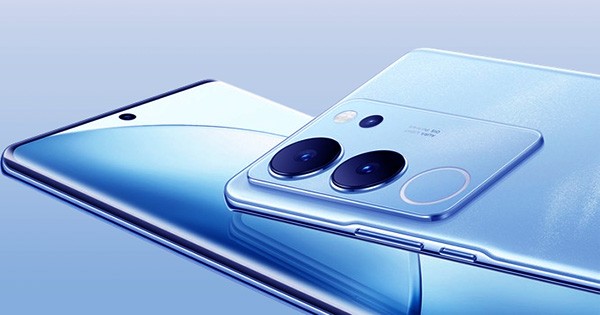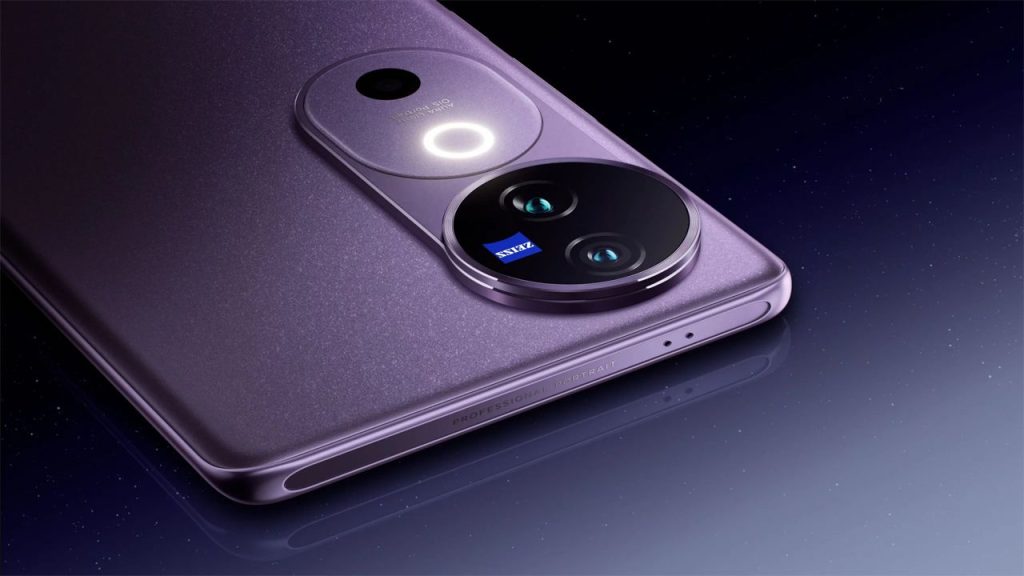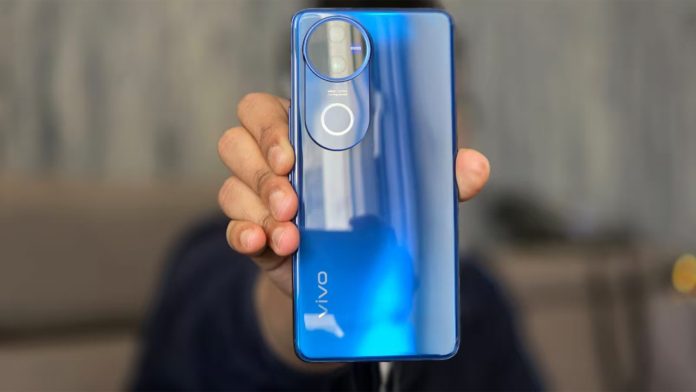The Vivo V50 represents a substantial advancement in Vivo’s midrange portfolio, combining flagship-grade design with excellent camera technology co-engineered by Zeiss. Positioned as a successor to the V29 series, the V50 boasts a sleek new design, a brighter and more robust display, updated imaging features, and a huge battery—all at an affordable price. But, with fierce competition from manufacturers like OnePlus, Xiaomi, and Samsung in the same price range, does the Vivo V50 provide a luxury experience at a midrange price? In this review, we look at the design, camera performance, hardware, and overall usefulness to determine if it lives up to the promise.
VIVO V50 KEY FEATURES
The Vivo V50 combines flagship design with practical performance, delivering remarkable features in the middle segment. It has a magnificent 6.77-inch AMOLED display with a 120Hz refresh rate and an ultra-bright 4,500 nits visibility, all protected by Diamond Shield glass. It runs on the Snapdragon 7 Gen 3 processor and has up to 12GB of RAM and 512GB of storage for seamless everyday operation.
Photography is a significant highlight, with Zeiss-co-engineered triple 50MP cameras (rear and selfie) that produce natural color, clear pictures, and crisp 4K video from both sides. The huge 6,000mAh battery (in the Elite Edition) and 90W rapid charging ensure that you stay charged throughout the day.
With Android 15, IP68/69 durability, dual speakers, and a slim 7.45mm body, the Vivo V50 provides a flagship-level experience without the blockbuster price.
Pros
- Slim and stylish IP69-rated design
- Smooth software experience
- Bright quad-curved AMOLED display
Cons
- Not ideal for serious gaming
- Camera performance is a mixed bag
Vivo V50 Design & Display: Sleek IP69 Body Meets 120Hz AMOLED Power

The Vivo V50 stands out for its elegant quad-curved glass body, which provides a premium feel and modern looks. It comes in attractive tones such as Starry Blue and Rose Red and is both stylish and sturdy, with an IP68/IP69 rating. Its 6.77-inch AMOLED display is stunning with a 120Hz refresh rate, HDR10+ support, and a peak brightness of 4,500 nits, making it ideal for binge-watching and bright outdoor use.
Design
- Vivo achieved an incredibly small form factor, measuring only 7.4-7.6mm thick and weighing 189g (Ti Grey) or 199g (Rose Red/Starry Blue). This is especially impressive given the huge 6,000mAh battery within.
- It has a glass front and a back made of either glass or plastic, depending on the color—glass for Rose Red and Mist Purple, plastic for Titanium Grey—but both varieties feel solid and well-finished.
- Available in Rose Red, Titanium Grey, and Starry Night, with the latter featuring a unique 3D-Star holographic finish that shimmers in light.
- The rear camera module has a distinct two-step circular design with a big Aura Ring Flash surrounded by a diamond-patterned metal ring, which adds a polished luxury touch.
- With IP68 and improved IP69 classifications, this midrange phone is resistant to dust, immersion up to 1.5 m, and high-pressure water spray, making it one of the toughest options.
- With softly curved edges and better haptic input, it’s ideal for extended typing and gaming sessions.
Display
- The huge 6.77-inch AMOLED display has a flat and slightly curved 2.5D glass-edge structure, providing an immersive viewing experience.
- The 120Hz refresh rate ensures smooth performance, with dynamic choices (120Hz/60Hz/Smart Switch). It also supports HDR10+ content and Widevine L1 certification, making it suitable for HDR streaming on Netflix, Prime, and YouTube.
- Lab testing validates the official peak brightness of up to 4,500 nits (1,274 nits in full auto and tiny peaks surpassing 3,000 nits). The manual maximum brightness of 588 nits guarantees clear daylight legibility.
- The panel is 10-bit and has a P3 color gamut. In “Professional” mode, ΔE averages around 1.1, indicating outstanding color fidelity. Vivid or bright modes may cause modest shifts in blue and red tones.
- Offers FHD+ resolution (1080 x 2392, ~388 ppi). While there is a tiny drop from the V40’s 1260p screen, most users will not notice the difference because the material stays crisp.
- Diamond Shield Glass (developed with Schott) provides ~50% more drop protection than prior generation Schott glass.
Vivo V50 Camera Review: Zeiss Portraits, 50MP Selfies & 4K Video Tested

The Vivo V50 stands out with its triple 50MP camera setup—main, ultra-wide, and selfie—all with autofocus and 4K video. OIS and Zeiss tuning enable the primary sensor to take vivid, detailed photos in both daylight and low-light conditions. The ultra-wide also functions as a macro lens, while the selfie camera captures excellent photos with natural tones. Aura Light 2.0, Zeiss bokeh styles, and Film Camera Mode make it a creative force in its class.
Rear Cameras:
- 50 MP Primary (Sony IMX882, OIS, f/1.88)
- 50 MP Ultra-Wide (119˚ field of view)
Front Camera:
- 50 MP Autofocus Selfie Camera (Eye tracking)
- Excellent detail, 4K selfie video supported
Photography Features:
- Aura Light 3.0: Soft ring light for low-light portraits
- Zeiss Natural Color 2.0: Accurate color calibration
- Zeiss Multifocal Portrait Modes: 23mm, 35mm, and 50mm
- 4K video recording (front and back)
- AI Night Mode, Bokeh Flare, Beauty Filters
Vivo V50 Performance Review: Snapdragon 7 Gen 3 Benchmarks & Gaming Tested
Processor & Hardware: The Snapdragon 7 Gen 3 provides smooth everyday performance, but it is not designed for demanding gaming or extreme multitasking. It performs well with social media, streaming, and minor editing, although frame dips may occur in demanding games like Genshin Impact at medium settings.
- Chipset: Snapdragon 7 Generation 3 (4nm)
- RAM and storage: Up to 12GB LPDDR4X RAM and 512GB UFS 2.2
- Cooling: Vapor chamber for temperature regulation
- Android 15 with Funtouch OS 15.
Gaming & Graphics:
- GPU: Adreno 720.
- Gaming: COD Mobile runs smoothly, while Genshin Impact suffers at high settings.
- Thermals: Gets warm around the camera module under load, but no significant throttling.
AI Features
- AI Eraser 2.0: Works, but not always cleanly
- Live Call Translation: Surprisingly accurate for Hindi and Marathi
- Circle to Search: Handy for quick lookups
The Vivo V50 performs well for casual users, but power users and gamers may find it limited. It excels in design, battery life, and camera quality, but performance is only average for its price point.
Vivo V50 Battery Review: Massive 6,000mAh with 90W Fast Charging Tested
The Vivo V50 features a 6,000mAh silicon-carbon battery that may last 1.5 to 2 days on a single charge. Despite its tiny form, it has an excellent screen-on time (~11 hours). It charges from 0 to 100% in 55-65 minutes using 90W fast charging and also allows reverse wired charging. It’s one of the most power-efficient phones in its class, ideal for extended periods of streaming, gaming, or photography. Tested at 6,000mAh with 90W fast charging.
The use of BlueVolt technology, which uses a silicon-carbon battery chemistry, increases power density and adds to longer battery life. Vivo says that the V50’s battery retains 80% capacity after four years due to superior battery management algorithms. With excellent Funtouch OS optimizations, the V50 has exceptional standby performance, lasting 3 to 4 days without active mobile or Wi-Fi connections. The V50 includes AI Sleep Mode, which automatically regulates background operations to save battery life during periods of inactivity.
Network | Technology | GSM / HSPA / LTE / 5G |
Launch | Announced | 2025, February 17 |
Status | Available. Released 2025, February 25 | |
Body | Dimensions | 163.3 x 76.7 x 7.4 / 7.6 / 7.7 mm |
Weight | 189 g or 199 g (6.67 oz) | |
Build | Glass front, glass back or plastic back | |
SIM | Nano-SIM + Nano-SIM | |
IP68/IP69 dust tight and water resistant (high pressure water jets; immersible up to 1.5m for 30 min) | ||
Display | Type | AMOLED, 1B colors, HDR10+, 120Hz, 3840Hz PWM, 1300 nits (HBM), 4500 nits (peak) |
Size | 6.77 inches, 110.9 cm2 (~88.5% screen-to-body ratio) | |
Resolution | 1080 x 2392 pixels (~388 ppi density) | |
Protection | Diamond Shield Glass | |
Platform | OS | Android 15, up to 3 major Android upgrades, Funtouch 15 |
Chipset | Qualcomm SM7550-AB Snapdragon 7 Gen 3 (4 nm) | |
CPU | Octa-core (1×2.63 GHz Cortex-A715 & 3×2.4 GHz Cortex-A715 & 4×1.8 GHz Cortex-A510) | |
GPU | Adreno 720 | |
Memory | Card slot | No |
Internal | 128GB 8GB RAM, 256GB 8GB RAM, 256GB 12GB RAM, 512GB 12GB RAM | |
UFS 2.2 | ||
Main Camera | Dual | 50 MP, f/1.9, 23mm (wide), 1/1.55″, 1.0µm, PDAF, OIS 50 MP, f/2.0, 15mm, 119˚ (ultrawide), 1/2.76″, 0.64µm, AF |
Features | Color spectrum sensor, Zeiss optics, Ring-LED flash, panorama, HDR | |
Video | 4K@30fps, 1080p@30fps, gyro-EIS, OIS | |
Selfie camera | Single | 50 MP, f/2.0, 21mm (wide), 1/2.76″, 0.64µm, AF |
Features | Zeiss optics, HDR | |
Video | 4K@30fps, 1080p@30fps | |
Sound | Loudspeaker | Yes, with stereo speakers |
3.5mm jack | No | |
Comms | WLAN | Wi-Fi 802.11 a/b/g/n/ac/6, dual-band |
Bluetooth | 5.4, A2DP, LE | |
Positioning | GPS, GALILEO, GLONASS, QZSS, BDS, NavIC | |
NFC | Yes (market/region dependent) | |
Radio | No | |
USB | USB Type-C 2.0, OTG | |
Features | Sensors | Fingerprint (under display, optical), accelerometer, gyro, proximity, compass |
Battery | Type | Si/C 6000 mAh |
Charging | 90W wired, PD Reverse wired | |
Misc | Colors | Ancora Red (Rose Red), Satin Black (Titanium Grey), Starry Blue (Starry Night), Mist Purple |
Models | V2427 |


